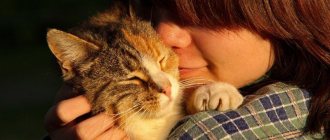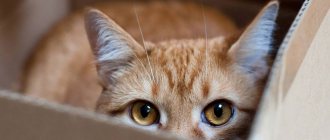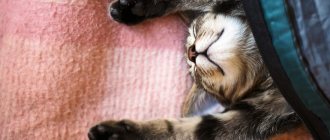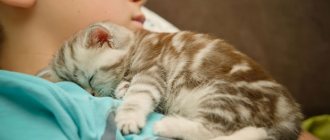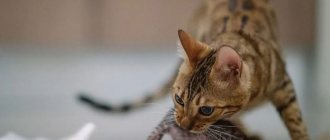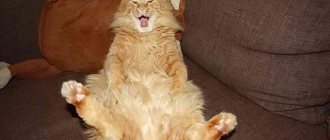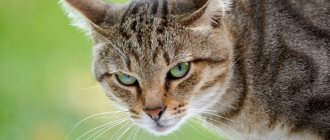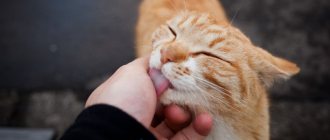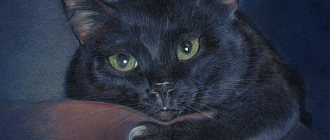Small animals can sometimes be very funny, so it is interesting to observe the behavior of pets. Of course, their actions need to be corrected. Especially if you are raising a kitten. Large pets can also behave incomprehensibly, puzzling the owner. The cat's actions can be so funny that owners don't have to lose heart. But the reasons for your four-legged friend's actions may remain unclear. Does your pet manage to lick your hands and face? Let's think about why the cat does this.
Why does a cat lick its owner: the main reasons
Every true cat lover knows that his pet is an extremely independent and self-sufficient creature. Any owner of this animal, in the depths of his soul, has probably had the thought more than once that his cat actually believes that he is the head of the family, and for him a person is not a master, but a stupid slave. But we are used to thinking of ourselves as intelligent creatures, so we are often mistaken about the true reasons why a cat licks its owner. It is pleasant for a person to think that this is out of pure love and affection, that in this way the animal demonstrates its warm feelings for the person - its benefactor. This is partly true, but still we are forced to dispel this misconception a little and bring some clarity to this issue. So, here are the main reasons why a cat licks its owner’s feet, hands or head:
- She's marking her territory.
- She expresses her warm feelings and sympathy for the owner.
- She asks for affection.
- She takes care of her owner.
- She asks to eat.
As you can see, in half the cases the pet actually shows kind feelings towards the person if it licks him. But often he simply achieves some of his goals.
Is your cat sick?
There is also some not entirely pleasant information about why cats lick themselves and their owners. According to one version, the cat reacts with this behavior to skin diseases or parasites. In order to accurately determine whether there is any need to worry, the animal must be examined by a doctor. Beforehand, at home, you can identify whether there are reasons to worry. Rashes, dermatitis, and lichen will be noticeable. But to find out whether there are worms, monitoring the cat’s appetite, its well-being and feces will help.
You will be able to notice from the behavior of the predator what the mystery of this phenomenon lies. When she licks her owner's hands, she can do it with love or confusion. Observe your pet's behavior. Perhaps she just wants to show how she feels about you.
The basic Instinct
It's no secret that cats mark the territory they consider theirs by spraying their own urine everywhere. For many people, this becomes a real challenge and the reason that they simply do not get mustachioed pets. Indeed, the unpleasant and extremely pungent smell in the apartment is sometimes stronger than the love for an animal. Fortunately, this can be dealt with, and veterinarians know very well how to stop cats from peeing on furniture, walls, and the owner’s clothes.
However, this is not the only way for these animals to mark their own, or even “beat off” someone else’s. Pheromones that “brand” a cat’s possessions are also secreted with saliva and with the help of sebaceous glands located near the tail, behind the ears, around the mouth and on the head, between the eyes and ears.
This is the whole mystery of why a cat licks its owner and rubs against his legs: she simply leaves her secretions on him. A person will not be able to smell this smell, but other animals (including cats) very well can.
Cats bring this feature into people's lives instinctively - for example, a cat licks its cubs when they return from a walk, not only for the sake of washing, but also to “domesticate” them, to remove foreign, foreign odors from them.
Symptoms of diseases
There are cases when licking people is a desire to draw attention to the pet’s health problems, and not a show of love or a request for affection. These may be diseases or conditions such as:
- Skin parasites, including fleas. The cat worries not only about itself, but also about the people around it, and is trying to get rid of the problem.
- Allergy. If feeding is incorrect or the food is changed, skin problems can occur, which leads to excessive licking of yourself and those around you.
- Disturbances in general health. By licking frequently, the animal tries to signal that something is wrong with it. It is important to notice changes in behavior and contact a veterinarian promptly.
- Infectious diseases. Some of them cause itching and rashes on the skin, which irritates the pet and he tries to get rid of it in this way.
Friction on legs
The same natural mechanism for cats works with people. When a person comes in from the street, he smells wrong, which means it needs to be fixed. The cat rubs its muzzle against its owner’s legs, licks it, trying to reapply the lost olfactory marker to it.
By the way, the cat’s pheromones evaporate on their own over time, and this explains why the cat licks the owner’s head and other parts of his body, even if he has been at home for a long time and there are no competing individuals nearby. And of course, with the help of friction and licking, the animal attracts the attention of people and shows sympathy for them.
Taking care of hygiene
Well, of course, when licking a person, a cat tries to clean his “skin”, just as she is used to caring for her kittens. In the wild, a strong smell can give away an animal and attract an enemy. To destroy it, the cat will carefully lick hands washed with scented soap or neck or hair scented with shampoo.
You should not show your cat dissatisfaction with such a toilet. If you often drive a cat away, avoiding its rough tongue, the emotional connection and trust in the person may be disrupted. Saving him from danger, endowing him with the aromas of his “group”, the cat expects recognition and affection in return.
Cleansing a person from sharp, unpleasant or alien aromas, the cat exchanges its pheromones with the owner, so that the person, even at a distance, feels an emotional connection with his pet and does not forget about him.
Showing love
And yet, no matter how arrogant and isolated cats may be, they also know how to sincerely love their owner! They demonstrate their warm feelings by licking his hands, head and other parts of the body. Therefore, if you are wondering why a cat licks its owner’s face and what it could mean, know: she just loves him!
This method of transmitting positive emotions in purrs is laid down from a very early age, when the mother cat licks her babies, caresses them and takes care of them in every possible way. It has been scientifically proven that animals feel the mood of their owners very well; they are able to empathize with them, be happy and sad with them. Moreover, they also want to receive affection and care in return. But if the owner is in no hurry to show his warm feelings, the cat can easily take the first step and caress his owner, encouraging him to stroke or scratch himself.
Licking kittens and humans: what are the similarities?
It is not without reason that a cat shows care by licking. Even in childhood, your mother cat took such care of your pet. This action is associated with pleasant emotions that are associated with safety and protection. Have you noticed how a cat licks kittens? In fact, there is something similar in the behavior of a pet with a person. Cat love manifests itself in different ways, but it is through licking that the mother takes care of the kitten. She hides him from predators by licking his scent, and also teaches him to care for her fur. But even in the usual washing of children, the cat shows maternal affection.
In other cases, the owners observed that small predators can also lick each other. If your cat shows you such caring attitude, then he perceives you as part of his family.
A gentle request
Now let's figure out why a cat licks its owner's hands. This could also be a surge of warm feelings towards the person, but more likely it is a banal request for food. Firstly, cats have an excellent sense of smell, and they smell food coming from the owner’s fingers, and secondly, they remember how people hand feed them, which over time they begin to associate with food.
It should also be noted that pets perceive themselves as a full member of the family, so they often project their “kitten” habits onto people. Thus, it is customary for people with mustaches to lick themselves to maintain hygiene. Adult cats wash babies, teach them to take care of themselves, and in the same way they can take care of human cubs, and sometimes adults themselves, washing them and licking them with their rough tongue. This may be unpleasant for some, but you need to understand that the cat does this not out of bad intentions, but wanting to show his love.
Expression of love and affection
Scientists have found that the composition and amount of special pheromones produced by the cat’s special glands differs significantly in the periods before and after the birth of kittens. Females produce these odorous substances immediately after the kittens are born.
Scientists have conventionally called them “pacifying” pheromones. Their number increases after the birth of kittens and begins to decrease after the cat stops feeding the babies. This happens to facilitate the separation of the offspring from their mother and make them more independent.
Calming pheromones are produced, albeit in smaller quantities, but constantly. It is their presence that animal psychologists explain the attachment that a person feels for a cat. By thoroughly licking its owner and then rubbing its muzzle against him, the cat removes “foreign” odors and introduces its own. This is what happens when a furry family member wants to mark their human.
Licking is akin to hugs and kisses, a special sign of love. By exchanging smells with a person, cats “include” him in their group or “pack” on equal terms. A person feels calming pheromones on a “subconscious” level.
It is impossible not to love a pet who tries to show his interest, love, affection. Affectionate cats that lick the hands or cheeks of their owners are more often stroked, pampered, and their pranks are forgiven. Thus, the cat also has its own benefit by licking a person.
Basic rules for caring for cats
Well, and finally, we’ll briefly talk about how to care for representatives of the cat breed. You can’t say much new about this, because at least once in their life, everyone has started a purr, and therefore, in general terms, everyone knows what and how to do, however, not everyone knows the nuances of such an important task:
- The animal must have at least two bowls (one for food, the other for water). It is better to choose dishes made of stainless steel or food-grade plastic. Plates should be washed after every meal, this is very important!
- You cannot bathe cats. They themselves do an excellent job with their hygiene procedures, and a “headwash” will only harm them.
- In order for your pet's coat to be shiny and not fall off, it needs to be fed well and correctly.
- The cat must be trained to use the toilet in one specific place. It is best to use special granular fillers that are poured into plastic containers.
- The animal should have its own corner for rest and sleep, a secluded place where it can hide from people. This could be a basket, a box or a special house, the main thing is that the cat can easily get to his den and feel comfortable there.
That's all our recommendations. We hope you enjoyed reading our article!
How to break your pet's habit
When an owner is annoyed by such excessive attention from his cat, there are several ways to try to get rid of this habit:
- A game. By switching attention to entertainment and giving your pet an outlet for energy, you can relieve her for a while from the desire to lick something or someone.
- Weasel. If the problem is stress or lack of attention, you need to pet and hug the animal more often, and the problem will disappear soon.
- Change of interests. Apply a special solution – catnip – to your pet’s toys. It is sold in pet stores. Its scent will attract the cat's attention.
- Refusal. If your pet's behavior becomes overly intrusive, every time he tries to lick him, you need to gently but decisively push him away and make it clear that this is not worth doing. After some time, the method will work and the cat will stop trying.
- Substitution for another item. Buy a fur mitten and put it on your hand every time you try to lick your fingers. After time, attention will switch to the object, and the owner will no longer be needed.
It is worth remembering that such behavior of a pet can be due to a whole range of different reasons and there is no need to get angry or scold him for it. After all, with such behavior the cat does not want to cause harm, but is simply trying to attract the owner’s attention to his person or show love.
